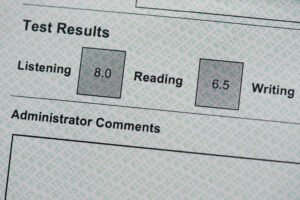The lawsuit that five students filed last month against the University of California, Irvine, doesn’t deny that their actions during pro-Palestinian protests last spring violated the institution’s code of conduct.
Instead, it alleges that the punishment they received—interim suspensions—violated the university’s own internal policies. The plaintiffs argue that administrators ignored due process requirements in order to impose a sweeping set of suspensions on protesters seeking to convince the UC system to divest from companies that profit off Israel’s war in Gaza.
The approach is one of a handful of legal avenues that protesters are taking to try to get their sanctions tossed out—or at least evaluated in a manner they consider fairer.
Thousands of student protesters are facing conduct violations—and, in some cases, criminal charges—after setting up pro-Palestinian encampments on U.S. campuses last spring, often violating institutional policies about where, when and how demonstrations can take place. Their punishments have ranged from short academic probations to expulsions, though most fall somewhere in the middle.
Many of those who received suspensions or expulsions say their lives and academic careers have been upended—especially if they lived and worked on campus—leading some to challenge their punishment in the hopes of returning to campus and resuming their studies. But even some students handed minor punishments are fighting the decisions, seeking to have their charges expunged to shield them from consequences with future employers or graduate programs.
Their strategies vary by institution and punishment type.
“There are really two fundamentally different challenges to what’s going on here,” said Jim Neumeister, senior research scientist in the Higher Education Analytics Center at NORC at the University of Chicago, a research firm. Some students, he said, are arguing against how their institution determined and meted out punishments, while others take issue with why they were punished, saying that their institution exhibited bias against them in the disciplinary process.
Interim Suspensions at UCI
The lawsuit against UCI focuses on the how. The five students listed as plaintiffs say they were given interim suspensions in April and May that are still in effect today.
They received such punishments after engaging in protests last spring, including the erection of an encampment on April 29, which led to weeks of negotiations between protesters and administrators. Eventually the encampment was disassembled and 27 students were arrested.
The plaintiffs allege that the university violated its own conduct policies—as well as state and federal due process protections—when it placed the students under interim suspension. The lawsuit says the students were not given prior notice of the suspension or the opportunity to respond—actions that courts have long said are required before imposing such sanctions. The institution also didn’t offer evidence to support the suspensions, the lawsuit alleges.
Such lawsuits, which challenge what the plaintiffs see as flaws in student conduct processes and procedures, are quite common, Neumeister said.
“That’s a pretty classic case that we’ve seen for decades in higher education,” he said.
The students also say their actions did not meet the UC system’s threshold for when interim suspensions are necessary. The policy states that interim suspensions should be used minimally, when there is reasonable cause to believe a student’s presence on campus could “lead to physical abuse, threats of violence, or conduct that threatens the health or safety of any person on University property.”
In general, Neumeister said, interim suspensions are designed to be short-term solutions, and if they last too long, that can be a red flag that they’re being used improperly.
In an emailed statement to Inside Higher Ed, a university spokesperson declined to comment on the litigation but reiterated that “from the onset and throughout the course of the unauthorized encampment, any students participating were repeatedly notified that their actions were violating university policy and that they would face sanctions including disciplinary measures such as interim suspension.”
The students’ lawyer, Thomas B. Harvey, disagreed, saying that the university did not adequately communicate the potential discipline to the students.
“Instead of saying, ‘We have some concerns about allegations that were made against you within the protest,’ they just immediately suspended these students without a hearing and without notice,” he said. “Some of these suspensions went on for two to three weeks before students even had a conversation with the university.”
Deferred Suspensions at Towson
Lawyers representing five students at Towson University, a public institution just north of Baltimore, have taken a slightly different approach in an effort to get their sanctions—deferred suspension, which goes into effect only if the student commits another conduct violation within a certain time frame—stricken from their permanent records.
The students received the penalties after participating in a 90-minute “die-in” on Tiger Plaza, a large quad on Towson’s campus, in November. During the demonstration, police and administrators asked them to move to another spot, which they declined to do.
The lawyers claim that the policies and procedures that led administrators to ask them to relocate—and to penalize them for not doing so—violated their First Amendment rights by making it difficult, if not impossible, for them to exercise their right to protest.
That’s because students must be part of an official student organization to access the online form that Towson requires for campus community members to sign up to protest, according to Nick Taichi Steiner, an attorney with the American Civil Liberties Union of Maryland.
The students, who are a part of an unofficial student group called the Towson Colonized People’s Revolution, said they tried to reserve a spot on Tiger Plaza but couldn’t because their organization was not registered, according to Steiner. During the protest, administrators asked them to move to one of two protest zones on the outskirts of campus available for people unaffiliated with Towson to use.
While institutions can legally require participants to register their protests in advance, different members of the university community should not have different standards for where and when they can protest, Steiner said.
He added that there should be limitations on when the university can require advanced registration, including when a protest is too small to be disruptive. Towson does have a policy on the books that says protests with fewer than 10 participants do not require prior registration. According to Steiner, the November die-in started out with fewer than 10 students and grew to 16 at most.
But in his view, the policy should take into account where the protest takes place and whether it is actually disruptive. The die-in should have been exempted from needing advanced registration, especially because it took place on such a large, public lawn, he said.
Previously on Tiger Plaza, “there [have been] Black Lives Matter protests and marches, tons of TU events where there are hundreds and hundreds of people present,” Steiner said. “Even if it was what the school says it was, which is 25 people, it was such a small group that they shouldn’t have been disciplined for not giving them advanced notice.”
Though the students’ sanction has since run its course, the ACLU sent Towson a letter, first reported by The Baltimore Sun, asking officials to expunge the students’ records; if not, the organization intends to take the university to court.
Steiner said that they have not received a response from Towson.
In an email to Inside Higher Ed, Towson spokesperson Jamie Abell wrote, “Towson University upholds the First Amendment and not only protects, but encourages opportunities for students, faculty and staff to gather and have dialogue. During the spring semester, gatherings or demonstrations were held on campus, sharing varying viewpoints while in alignment with university policies. As we prepare for the start of a new academic year, we look forward to continuing to foster a campus where all perspectives are welcome.”
“The student conduct process on the matter at hand is complete,” Abell wrote. “We look forward to the opportunity to discuss with the ACLU the facts of the matter in the coming days.”
No-Trespass Orders in Illinois
Seven pro-Palestinian student protesters who received interim suspensions and no-trespass orders from Illinois State University, meanwhile, have focused their legal challenge less on their institution’s policies and processes and more on allegations that administrators’ biases influenced their sanctions.
In a lawsuit filed Aug. 14, they claim that an ISU dean, whom they describe as an “avowed and proud Zionist,” targeted them for their political views. Many prior protests had taken place in Hovey Hall, the ISU administrative building where they were arrested in May, without leading to sanctions, they argue.
“The only difference between Plaintiffs’ protest and the hundreds of protests allowed by ISU in and around Hovey Hall over the years is what Plaintiffs were protesting about,” the lawsuit reads. It also alleges that the dean issued the suspension and no-trespass orders “to prevent Plaintiffs from holding another protest in favor of Palestine, and to punish Plaintiffs for supporting Palestine instead of Israel.”
This approach is rarer than those focused on processes, Neumeister said, drawing a comparison with Title IX lawsuits in which plaintiffs allege that their case was mishandled due to gender bias—a tactic that has become increasingly common over the past 15 years. (This paragraph has been updated to correct the kind of lawsuits Neumeister cited as a comparison; they’re Title IX, not Title IV.)
Jane Bambauer, a law professor at the University of Florida who specializes in First Amendment law, said that the case may rest on whether the university can prove there were nonpolitical reasons for the disparity in punishment between the pro-Palestinian protesters and previous Hovey Hall demonstrators.
“[If] it was not parallel to things that happened before—it either lasted longer, posed more of a hazard or they took over a building … these are factors that would or should matter,” she said.
She noted that just because universities didn’t previously enforce demonstration policies to their fullest extent doesn’t mean they have no right to do so later. At the same time, she said, “I would be very suspicious if they chose a highly politically controversial moment in time and topic to make that choice.”
ISU declined to comment on the pending litigation, and the students’ attorney, Sheryl Weikal, did not respond to an emailed request for comment.
What’s Next?
Students in both cases hope their charges will be dropped, but the ISU plaintiffs are also asking for monetary damages in excess of $50,000 each to make up for their lost tuition and housing during the suspensions. Meanwhile, plaintiffs in the UCI case want the court to issue an injunction that would prevent the university from implementing any further interim suspensions on any student protesters, unless they can show there is true need.
In the meantime, the UCI plaintiffs have filed a temporary restraining order to put their suspensions on hold until the case moves forward, which they hope will allow them to attend classes as usual. Harvey, their attorney, said he hopes to hear from a judge any day now about whether the order has been granted.
“Classes start in a couple weeks, and they can’t register for classes yet,” he said. “So, it’s one of those things that we want to urgently get in front of a court.”
Original Post: Read More
Source: Inside Higher Ed



